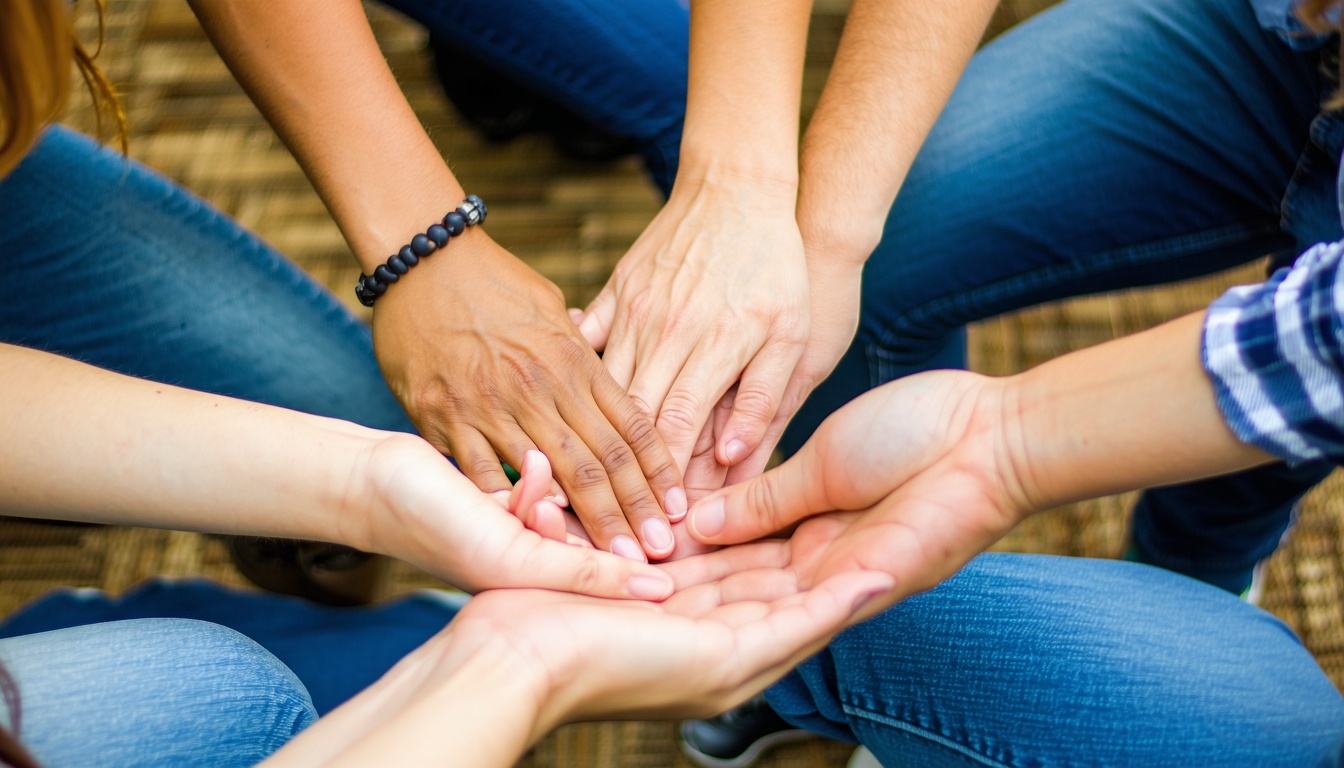Peer support groups are a powerful way to gain hope, understanding, and the motivation you need to improve your mental health. Whether you are dealing with substance use challenges, anxiety, or even the daily stressors of life, connecting with peers who share similar experiences can make all the difference in your overall sense of well-being. These groups have long been recognized for their ability to help individuals heal in ways that complement professional treatments. As you explore opportunities for outpatient behavioral health, psychiatric, and substance-use care, you might consider how participating in a peer support group could transform your recovery journey.
Below, you will find an in-depth look at how peer support works, how it differs from traditional therapy, and the variety of benefits you can expect. You will also discover how Epic Health Partners, a leader in comprehensive and evidence-based outpatient care, empowers you to incorporate peer support into a broader plan for lasting wellness. By understanding what these groups offer, you can decide whether they are the right next step for you or a loved one on a path to better mental health.
Discover the impact of peer groups
Peer groups bring together individuals who have lived or are living through similar experiences—such as battling addiction, coping with chronic illness, or managing mental health challenges. The essence of these groups lies in their shared understanding. Unlike typical professional settings where you meet only with clinicians, peer support places you alongside people who truly know what you are going through.
How peers shape recovery
When you join a peer support group, you are introduced to a space where your struggles are neither downplayed nor misunderstood. During sessions, members often share coping strategies and discuss practical, real-world scenarios. Research has shown that peer-led programs can significantly reduce social isolation while deepening people’s understanding of their conditions (PubMed Central). Members also act as positive role models, demonstrating that recovery is not only possible but can be sustained through camaraderie and consistent support. It is a novel sense of understanding that close friends and family—even if loving—may not always be capable of offering.
The motivating power of belonging
Feeling connected to a community is compelling. For example, in men’s rehab settings, you may find that unraveling deeply embedded behaviors sometimes requires the presence of empathetic peers who understand gender-specific pressures. Likewise, individuals dealing with opioid use disorder might benefit from hearing how others have handled their own relapses or urges. By exchanging stories and relating to each other’s goals, you gain a strong sense of belonging that boosts both hope and accountability.
Stats on prevalence
Within the United States alone, more than 500,000 support groups address a range of issues—everything from anxiety to addiction to chronic pain management (Community Tool Box). Over 6.25 million Americans are actively involved in such self-help and support groups, and about 15 million have taken part at some point in their lives. These numbers show that peer groups pave the way for a widely accessible approach to mental health and substance use care that feels personal, immediate, and encouraging.
Explore the differences from therapy
Peer support groups and professional therapy both have an essential place in the continuum of care. However, it helps to understand how they differ in structure, purpose, and outcome. This way, you can better integrate them into a comprehensive strategy for overcoming mental and behavioral health challenges.
Peer support vs. traditional therapy
- Led by peers vs. led by professionals: In many peer groups, the facilitator may be a layperson who shares the same lived experience. In contrast, therapy is typically overseen by a licensed professional, such as a psychiatrist, psychologist, or licensed counselor.
- Focus on shared experience vs. clinical approach: Peer support groups prioritize equal participation and a shared focus—members are both learners and teachers. Professional therapy, however, uses clinical strategies informed by evidence-based research.
- Self-help orientation vs. therapeutic framework: While therapy often focuses on diagnosing, treating, and managing specific conditions, peer support groups emphasize mutual strengths, practical tips, and emotional reinforcement.
These distinctions can be vital in deciding how you want to combine multiple forms of treatment. For instance, you might have weekly appointments for individual therapy mental health to address deeper behavioral or emotional issues while also attending a weekly peer meeting to maintain the motivational support you need.
Complementary roles
You are not required to choose between a peer support group and professional therapy. In fact, many find that doing both simultaneously offers the best route to recovery. Peer support can serve as a supplemental environment where you practice healthy coping methods learned in therapy. It can also help you continue your progress day to day by providing consistent connection.
If you need a more intensive level of care, Epic Health Partners offers options such as an intensive outpatient program iop or even a partial hospitalization program php. You can then integrate peer support into these programs to further strengthen your mindset and skill set.
Examine key benefits for recovery
Beyond simply having a place to vent, peer groups target personal growth, resilience building, and change. The benefits can manifest emotionally, socially, and behaviorally, especially if you are also combining them with holistic care approaches.
Emotional and psychosocial support
One of the most noticeable benefits you may experience is a sense of mutual recognition. Sharing stories with individuals who also grapple with anxiety, depression, or substance use challenges allows you to feel acknowledged. According to Mayo Clinic, group members often share similar worries, side effects, or decisions about treatment (Mayo Clinic).
Even more specifically, in men’s rehabilitation contexts, peer support fosters openness. Men often face cultural expectations to suppress vulnerability, which can hamper emotional growth. In a peer group designed around men’s challenges, it becomes easier to admit difficulties and ask for the guidance you need. That honest dialogue is what drives lasting transformation.
Practical self-care strategies
You will quickly find that peer support groups are full of practical tips and day-to-day coping insights. Members share tried-and-true techniques for dealing with triggers, cravings, or anxiety. For instance, someone who once struggled with social situations might offer a beneficial breathing exercise. Another member might explain how journaling helped them reflect on negative thought loops.
These insights tend to come wrapped in lived experience, which makes them feel concrete. They can supplement professional advice you receive in a psychiatric evaluation outpatient session or from medication management. As you accumulate tips from peers, you build a well-rounded toolkit for everyday resilience.
Sense of accountability
Peer groups often form close bonds that keep you accountable for continuing your progress. When you have that weekly or monthly check-in with your group, you come prepared to share wins and losses. This mutual responsibility helps you push forward. It also lessens the shame or stigma you might have carried in isolation.
In fact, peer accountability is especially powerful for those working through substance use. Knowing you have a supportive group that values your input and recovery journey can be the difference between giving in to a craving and seeking help. If you have struggled with relapse, openly discussing setbacks can actually bring you closer to the group, strengthening your resolve to continue with interventions like medication assisted treatment mat or substance use outpatient therapy.
Reduced isolation
Whether you are dealing with depression, anxiety, or opioid use, it is easy to feel alone. Peer groups counteract this loneliness by offering you direct human contact with others who understand your emotions. This sense of community can be a powerful buffer against the hopelessness that often accompanies mental health struggles.
Given that group size often ranges from 5 to 15 individuals, you will likely have enough diversity to hear multiple perspectives, yet small enough that you remain connected to everyone (Community Tool Box). This environment is intimate enough to promote trust but large enough to sustain discussions and keep the conversation going.
Consider types of peer support
While you might picture a circle of chairs in a community center, peer support groups come in many forms. You can customize your involvement based on personal preference, time availability, and the nature of your condition.
In-person groups
In-person gatherings provide face-to-face interactions, which often lead to stronger emotional connections. Many local community organizations or nonprofit advocacy groups hold free or low-cost meetings you can attend regularly. These groups can range from general mental health or addiction groups to specific curated gatherings for men, women, seniors, or even families.
Online peer communities
If you are juggling busy schedules, mobility challenges, or social anxieties, you can still benefit from online peer support groups. Platforms vary from structured video conference sessions to asynchronous message boards and chat rooms. While this digital format can offer accessibility and anonymity, keep in mind it might also pose a few risks. Finding a secure, reputable forum is crucial to avoid misinformation or lack of confidentiality (Mayo Clinic).
Specialized groups
For those dealing with specific conditions or life circumstances, specialized peer support might be key to meaningful engagement. You can find groups for single parents, veterans, individuals with co-occurring mental health and substance use issues, or even those facing niche medical diagnoses. Attending a group that closely aligns with your own challenges can help you find more targeted advice. If you have compounding concerns, consider a comprehensive approach with co occurring disorders treatment, which can also refer you to peer groups specializing in those areas.
Family-oriented groups
Addiction and mental health challenges rarely affect just the individual—they impact entire families. Family-based peer support groups exist to help relatives manage their feelings of helplessness or frustration, share coping strategies, and learn from those in similar caregiver roles. Often, families who participate in these groups can better support their loved one’s recovery while also attending to their own emotional needs.
Embrace Epic Health Partners’ services
Peer support groups can be a cornerstone of recovery, but they often work best as part of a broader, personalized plan. Epic Health Partners is prepared to guide you through all aspects of outpatient behavioral health, psychiatric, and substance use care. By integrating peer support with professional treatment, you can address not only the emotional underpinnings of addiction or mental illness but also the external factors that influence your day-to-day wellness.
Comprehensive outpatient programs
Your specific situation determines which combination of services is the best fit. You might benefit from:
- Intensive outpatient program iop: Offers a higher level of structured support while still allowing you to maintain daily responsibilities at home or work.
- Partial hospitalization program php: Provides intensive, day-long care without requiring an overnight stay, beneficial for those needing close monitoring.
- Telehealth therapy services: Enables you to access professional counseling remotely, increasing convenience and adherence.
Throughout these programs, you remain part of a supportive environment that addresses the unique challenges you face—whether as a man exploring men’s rehab approaches or as someone experiencing co-occurring disorders. In addition, you have the option to share experiences from your group in therapy or vice versa, creating a dynamic feedback loop that encourages lasting growth.
Medication and medical support
If you require medications for your mental health or substance use challenges, Epic Health Partners also offers medication management. This service ensures that any prescriptions you receive are carefully supervised, so you can minimize potential side effects and maintain the best possible results. For individuals struggling with opioid dependence, medication assisted treatment mat can help bridge the gap between clinical interventions and peer-driven motivational support.
Tailored therapy and counseling
A major value of Epic Health Partners is the breadth of therapy options available to you, from cognitive treatments to trauma-informed practices. For instance, you can combine something like trauma informed counseling with a peer support group of individuals who have addressed or are addressing trauma-related stress. This integrated approach helps you navigate emotional wounds and triggers in someone else’s company who has overcome similar hardships, strengthening your resolve to continue healing.
Additionally, specialized counseling, such as family counseling mental health or group therapy mental health, offers a distinct angle on how social interactions and relationships shape your wellness. The more avenues for healing and self-awareness you can access, the more comprehensive your care—and the better prepared you are to tackle long-term recovery.
Holistic focus on overall well-being
Recovery extends beyond any single area of life. To that end, Epic Health Partners promotes a well-rounded focus on mind, body, and spirit. Together with professional therapy, you might discover new ways to handle stress—whether it is through yoga art therapy music therapy or additional holistic wellness support. You may even learn how to better manage conditions like anxiety or depression, employing integrated techniques that reflect your unique lifestyle and health profile.
It is this individualized method of blending peer support with comprehensive care that helps you find true resilience, with enough flexibility in your plan to adapt as you reach new milestones in your journey.
Frequently asked questions
1. Are peer support groups the same as therapy?
No, peer support groups differ in that they are typically led by peers—people with personal experience in managing a particular issue. Therapy, on the other hand, is facilitated by licensed professionals who provide structured treatment protocols. Peer support is an excellent supplement to therapy, as it offers you a sense of community, shared experiences, and practical tips you can incorporate into your broader recovery plan.
2. Can I attend a peer support group if I am already in professional counseling?
Yes. Attendance in a peer support group can complement your individual or family counseling mental health sessions. Many individuals find that discussing everyday challenges in both settings makes their learning more robust and helps them sustain progress over time.
3. Are online peer support groups effective?
They can be highly beneficial, especially for those with scheduling constraints or mobility issues. Online groups offer a sense of anonymity and convenience. However, you might need to exercise caution regarding privacy and the quality of information shared. Look for hosted groups affiliated with reputable organizations, such as nonprofits or medical institutions, to ensure you have trustworthy guidance.
4. How do I find the right peer support group?
Start with identifying your specific needs. Are you looking for a group that focuses on men’s mental health, addresses opioid addiction, or handles co-occurring disorders like depression and substance use? Checking with a professional provider can be a great first step. You can also find listings through national directories, community centers, or reliable organizations like Mental Health America. If you need comprehensive care in tandem with group support, Epic Health Partners can connect you to programs that align with your personal situation.
5. Does Epic Health Partners offer peer support groups?
Epic Health Partners integrates peer support principles into its broader outpatient services, ensuring that you have access to community and professional resources. While they provide a wide range of program types—from intensive outpatient program iop to substance use outpatient therapy—they can also guide you towards reputable peer-led groups that match your needs. This combination enables you to experience empathy-driven support alongside evidence-based medical and therapeutic treatments.
Finding your way toward better mental health or substance-use recovery often requires multiple layers of support. Peer support groups can serve as a key piece of that puzzle, supplementing the clinical expertise you receive from professionals while anchoring you in a community that understands your journey firsthand. Such groups aim to foster self-esteem, provide emotional relief, and encourage you to stay engaged with your long-term plan for healing.
With Epic Health Partners, you can benefit from an integrated approach that unites peer support’s empathy and community focus with a full range of outpatient programs, such as partial hospitalization for more intensive care or telehealth that brings therapy to you wherever you are. By mingling these resources, you stand to gain a broader perspective on how to manage daily challenges and maintain a healthier lifestyle.
You deserve the sense of camaraderie and empowerment that comes from navigating your journey alongside others who share similar challenges. When you combine that solidarity with the professional expertise of Epic Health Partners, you create a supportive environment that addresses your unique challenges and preferences. Whether you need help for yourself or a loved one, consider how peer support groups can amplify the effectiveness of evidence-based treatments, ushering in the sustained recovery and mental wellness you seek.







